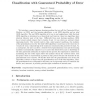Free Online Productivity Tools
i2Speak
i2Symbol
i2OCR
iTex2Img
iWeb2Print
iWeb2Shot
i2Type
iPdf2Split
iPdf2Merge
i2Bopomofo
i2Arabic
i2Style
i2Image
i2PDF
iLatex2Rtf
Sci2ools
129
click to vote
ML
2010
ACM
2010
ACM
Classification with guaranteed probability of error
We introduce a general-purpose learning machine that we call the Guaranteed Error Machine, or GEM, and two learning algorithms, a real GEM algorithm and an ideal GEM algorithm. The real GEM algorithm is for use in real applications, while the ideal GEM algorithm is introduced as a theoretical tool; however, these two algorithms have identical behavior most of the time. Differently from most learning machines, GEM has a ternary-valued output, that is besides 0 and 1 it can return an unknown label, expressing doubt. Our central result is that, under general conditions, the statistics of the generalization error for the ideal GEM algorithm is universal, in the sense that it remains the same, independently of the (unknown) mechanism that generates the data. As a consequence, the user can select a desired level of generalization error and the learning machine is automatically adjusted so as to meet this desired level, and no knowledge of the data generation mechanism is required in this pr...
Related Content
| Added | 20 May 2011 |
| Updated | 20 May 2011 |
| Type | Journal |
| Year | 2010 |
| Where | ML |
| Authors | Marco C. Campi |
Comments (0)

